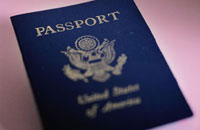10 Top Preparation Tips for Traveling Overseas
Apply early for your passport and, if necessary,
any visas. Passports
are required to enter and/or depart most countries
around
the world. Apply for a passport as soon as possible. Some
countries
also require U.S. citizens to obtain visas before entering. Most
countries require visitors who are planning to study or work abroad
to obtain visas before entering. Check with the embassy of the foreign
country that you are planning to visit for up-to-date visa and other
entry requirements. (Passport and visa information is available
on the Internet at Travel.State.Gov)
 |
Travelers
should apply for a passport as soon as possible. |
Learn
about the countries that you plan to visit. Before
departing, do some research about the people
and their culture, and any problems that the country is experiencing
that may affect your travel plans. The Department of State publishes
background notes on about 170 countries. These brief, factual
pamphlets contain information on each country's culture, history,
geography, economy, government, and current political situation.
(Background notes available at U.S. Department of State)
Read
the Consular Information Sheet. Consular information
sheets provide up-to-date travel information on any country you plan to visit. They cover topics such as entry
regulations, the crime and security situation, drug penalties,
road conditions, the location of the U.S. embassy, consulates,
and consular agencies.
Check
for Travel Warnings and Public Announcements. Travel
Warnings recommend U.S. citizens defer travel to a country because
of dangerous conditions. Public Announcements provide fast-breaking
information about relatively short-term conditions that may pose
risks to the security of travelers.
Register
with the nearest U.S. embassy or consulate.
 |
Travelers should register with the nearest U.S. embassy just in case. |
Register
with the nearest U.S. embassy or consulate through the State Department's
travel registration website. Registration will make your presence
and whereabouts known in case it is necessary to contact you in
an emergency.
In accordance with the Privacy Act, information on your welfare and whereabouts may not be released without your authorization. Leave a detailed itinerary and the numbers or copies of your passport or other citizenship documents with a friend or relative in the United States. (U.S. embassy and consulate locations can be found in the country's Consular Information Sheet.)
If your family needs to reach you because of an emergency, they can pass a message to you through the Office of Overseas Citizens Services at 202-647-5225. This office will contact the embassy or consulate in the country where you are traveling and pass a message from your family to you.
Remember consular officers cannot cash checks, lend money or serve as your attorney. If the need arises, they can assist you in obtaining emergency funds from your family, help you find an attorney or medical assistance, and replace a missing passport.
Before committing yourself or your finances, find out about the organization and what it offers. The majority of private programs for vacation, study or work abroad are reputable and financially sound. However, some charge exorbitant fees, use deliberately false "educational" claims, and provide working conditions far different from those advertised. Even programs of legitimate organizations can be poorly administered.
How to Access Consular Information Sheets, Travel Warnings, and Public Announcements
There are four ways to obtain Consular Information Sheets, Travel Warnings, and Public Announcements:
- Telephone: Call the Office of Overseas Citizens Services at 202-647-5225.
Mail: Send a self-addressed, stamped, business-size
envelope to:
Overseas Citizens Services, Room 4811,
Department of State,
Washington, DC 20520-4818.
On the outside envelope, write the name of the country or countries needed in the lower left corner.
Also available at Travel.State.Gov: passport applications and procedures, foreign and U.S. visa information, travel publications (including the pamphlet Travel Warning on Drugs Abroad), and links to several U.S. embassy and consulate web sites worldwide.
Additional Information For Traveling Students |
1. Make sure you have a signed, valid passport and visas, if required. Also, before you go, be sure to fill in the emergency information page of your passport!
2. Read the Consular Information Sheets (and Public Announcements or Travel Warnings, if applicable) for the countries you plan to visit.
3. Leave copies of your itinerary, passport data page and visas with family or friends at home, so that you can be contacted in case of an emergency. Make sure to keep your host program informed of your whereabouts.
4. Have medical insurance that will cover your emergency needs (including medical evacuation) while you are overseas.
5. Familiarize yourself with local laws and customs of the countries to which you are traveling. Remember, while in a foreign country, you are subject to its laws!
6. Do not leave your luggage unattended in public areas and never accept packages from strangers.
7. While abroad, avoid using illicit drugs or drinking excessive amounts of alcohol and associating with people who do.
8. Do not become a target for thieves by wearing conspicuous clothing and expensive jewelry and do not carry excessive amounts of cash or unnecessary credit cards.
9. Make sure to deal only with authorized agents when you exchange money to avoid violating local laws.
10. Avoid demonstrations and other situations that may become unruly or where anti-American sentiments may be expressed. |
(Source: US Department of State - Bureau of Consular Affairs)
|